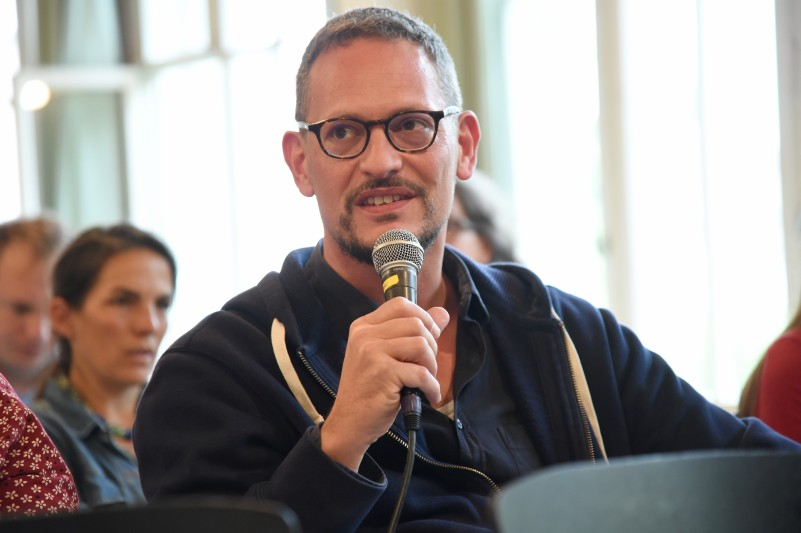Share post now

global
The Alliance Sud magazine analyses and comments on Switzerland's foreign and development policies. "global" is published four times a year (in german and french) and can be subscribed to free of charge.
Article, Global
24.06.2021, International cooperation
Mark Herkenrath is an adjunct Professor of Sociology at the University of Zurich and has conducted research, among other things, on the development implications of economic globalisation and on civil society opposition in Latin America and the USA to the Free Trade Area of the Americas (FTAA). Prior to taking over the directorship of Alliance Sud in 2015, he had already been a member of its team since 2008, with responsibility for the area of international finance and tax policy.

Mark Herkenrath an einer Veranstaltung der zivilgesellschaftlichen Plattform Agenda 2030
© Martin Bichsel
The 2030 Agenda for Sustainable Development was adopted in 2015 and was hailed internationally at the time as a major milestone. So far, however, the Federal Council has hardly implemented anything and the general public knows very little about the Sustainable Development Goals (SDGs). Why is this so?
The Federal Council’s support of the 2030 Agenda is woefully insufficient. It is reluctant to approve new funds for implementing the Agenda and merely wants to incorporate global sustainable development into already existing policy. It is also doing too little to familiarise the general public with the 2030 Agenda. That task falls to the non-governmental organisations even though, at the behest of Foreign Minister Ignazio Cassis, they are now no longer allowed to use federal funds for educational and awareness-raising work in Switzerland.
Yet Federal Councillor Cassis has taken up the cause of sustainability in the new foreign policy strategy…
In 2018, one year after assuming office, Federal Councillor Cassis distanced himself from the 2030 Agenda! In an interview with the “Basler Zeitung”, he vented his annoyance at never having been consulted about the 2030 Agenda in his previous role as a Member of Parliament. As with the UN Global Compact for Safe, Orderly and Regular Migration, he also poured scorn on the Agenda as a concoction of diplomacy that was at odds with domestic policy decisions. In the meantime, however, he seems to have better grasped the fact that an equitable and sustainable world is also in Switzerland’s interests.
The Responsible Business Initiative represented a respectable achievement by Swiss civil society at the polls. In the wake of the referendum, conservative politicians are now keen to limit the leeway available to NGOs (see global #81). Have NGOs become too powerful?
(Chuckles.) That sounds as though NGOs had marched with whole hosts of people to the polls on the Sunday of the referendum to cast their votes. The fact is that in Swiss democracy it is still the voters who ultimately decide. And they certainly make up their own minds. In the referendum on the Responsible Business Initiative, 50.7 per cent of voters came out in favour of an open-minded Switzerland that displays solidarity. The public has legitimate faith in the very well documented cases researched by NGOs; in contrast, their trust in the private sector’s business associations is wavering. No-one still believes the assertion that the interests of the business sector are also invariably good for Switzerland. Naturally, this poses a problem for conservative political circles.
In international cooperation, Switzerland is relying ever more on partnerships with the private sector. Alliance Sud has repeatedly cautioned about the risks entailed, but are there also opportunities?
Of course there are also opportunities, such as new jobs, investments and environment-friendly technologies. But that should not mislead us into ignoring the risks. In developing countries, foreign corporations often displace local companies from the market only to then shift their profits untaxed to low-tax jurisdictions like Switzerland. Moreover, there are human rights violations and environmental problems. This is why partnerships with the private sector in international cooperation should conform to selection criteria and specifications at least as stringent as those applied to partnerships with NGOs. The SDC and SECO are still a long way from this.
The climate movement and the pandemic are prompting ever more scholars to speak out in an endeavour to influence policymakers – is this a positive development?
Yes, this is a good development. In a functioning democracy, the population and their political representatives are expected to make well-informed decisions. This calls for expertise. Besides the expertise of academia, this also means the specialised know-how of NGOs and the ethical expertise of churches. When I still worked full-time in academia, commenting on current political affairs was roundly frowned upon in those circles; op-ed articles in the “NZZ” or in “le Temps” elicited raised eyebrows. Fortunately, things have improved in that regard.
Alliance Sud marks its 50th anniversary this year. What direction is development policy now taking and will it still be needed in 50 years’ time?
Development policy will always be with us: it is in fact global domestic policy. The 2030 Agenda underscores that the making of every policy decision must include gauging the way it will impact the entire world population as well as the future of the planet. We still have a far way to go, however, until the precept of global sustainable development is put into practice. Once again the powerful countries of the North are displaying a strong tendency to prioritise short-term national self-interest over the well-being of nature and humanity. International cooperation too is again increasingly being used to further economic and migration-related interests. This is why, even in the future, there will be the need for an Alliance Sud that pursues policy for the sake of an equitable world.
Share post now

global
The Alliance Sud magazine analyses and comments on Switzerland's foreign and development policies. "global" is published four times a year (in german and french) and can be subscribed to free of charge.